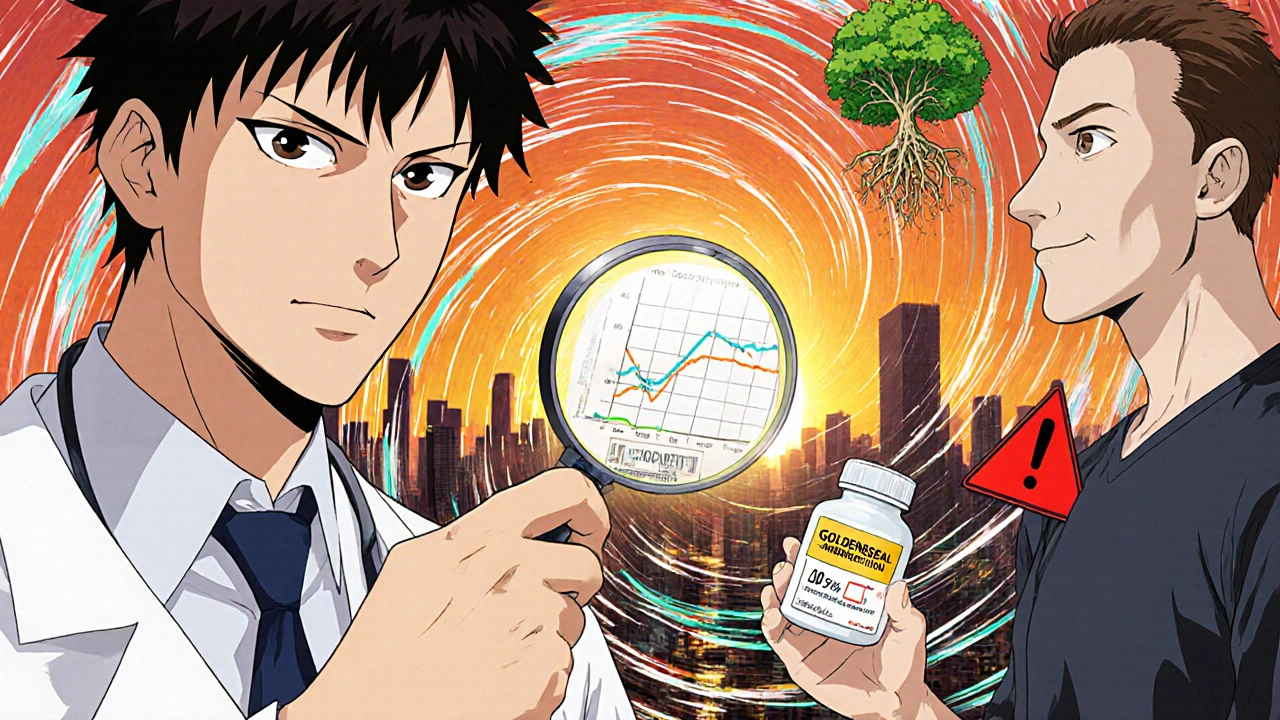What Happens When You Take Goldenseal With Metformin?
If you're taking metformin for type 2 diabetes and considering goldenseal as a natural supplement, you need to know this: goldenseal can reduce how well metformin works. This isn't just a theory-it’s been shown in clinical studies. Goldenseal, a plant-based supplement often marketed for immune support, contains berberine, a compound that interferes with how your body absorbs metformin. The result? Less metformin in your bloodstream, which could mean higher blood sugar levels than expected.
How Strong Is This Interaction?
The effect depends on your metformin dose. A 2025 clinical trial published in Clinical and Translational Science found that when people took goldenseal along with low doses of metformin (500-750 mg daily), the amount of metformin in their blood dropped by 20-25%. At moderate doses (1,000-1,500 mg), the drop was around 14%. But at high doses (2,000-2,550 mg), there was almost no change. Why? Because metformin’s absorption is already saturated at higher doses, so goldenseal can’t block it as effectively.
This interaction happens in the gut, not the liver. Earlier assumptions blamed liver enzymes, but new research shows goldenseal blocks a transporter called OCT1 in the intestines-the same one metformin uses to get into your bloodstream. Think of it like two cars trying to use the same narrow toll lane. Goldenseal gets in first and blocks metformin from passing through.
Why This Is Risky for People With Diabetes
Metformin doesn’t just lower blood sugar-it keeps it stable. If your body absorbs less of it, your blood sugar can creep up without you noticing. You might think your diet or stress is to blame, when it’s actually the supplement you started last month. This is especially dangerous if you’re on the lower end of the metformin dose range, which is common for older adults or those just starting treatment.
Here’s the twist: goldenseal’s active ingredient, berberine, also lowers blood sugar on its own. In fact, studies show berberine can reduce fasting glucose and HbA1c almost as well as metformin in some people. So while goldenseal might be reducing metformin levels, it’s also adding its own glucose-lowering effect. This creates a confusing, unpredictable mix. One person’s blood sugar stays steady because the two cancel each other out. Another person’s spikes because the metformin drop outweighs the berberine boost.

What the Experts Say
The MSD Manual Professional Edition (2024) warns clearly: “Goldenseal may decrease the blood levels of metformin, potentially hindering glucose control.” The Merck Manual Consumer Version adds that berberine can increase the risk of low blood sugar when combined with other diabetes meds. The American Diabetes Association doesn’t list goldenseal specifically-but it does say you should review all supplements with your doctor. The Endocrine Society issued a similar advisory in 2022, calling herbal-drug interactions a “critical oversight area” in diabetes care.
What’s alarming is how common this mix is. About 23% of U.S. adults take herbal supplements, and goldenseal is in the top 20. Among people with diabetes, that number jumps to 35-40%. Many assume “natural” means “safe,” especially when it’s sold in health food stores or online. But natural doesn’t mean harmless-especially when it’s interacting with a medication you rely on to stay healthy.
What Should You Do?
If you’re taking metformin and already using goldenseal:
- Don’t stop your metformin. Stopping suddenly can cause dangerous blood sugar spikes.
- Check your blood sugar more often. Look for patterns-do your numbers rise after you take goldenseal?
- Talk to your doctor or pharmacist. Bring the supplement bottle with you. They can help you decide whether to stop it, switch to something else, or adjust your metformin dose.
If you’re thinking about starting goldenseal:
- Ask your provider first. Even if you feel fine, this interaction can sneak up on you.
- Consider alternatives. If you want berberine’s benefits without the risk, talk to your doctor about a purified berberine supplement. But even then, dose adjustments may be needed.
- Don’t assume it’s safe just because it’s herbal. Goldenseal is endangered in the wild, and many products are mislabeled or contaminated. You’re not just risking your blood sugar-you’re supporting an unsustainable trade.
What About Berberine Alone?
Berberine is the reason people take goldenseal. But you don’t need goldenseal to get berberine. Purified berberine supplements (usually 500 mg, two to three times daily) are widely available and have been studied more directly for blood sugar control. In a 2023 meta-analysis of 27 trials, berberine lowered HbA1c by about 0.7% on average-similar to metformin’s effect. But here’s the catch: berberine can also cause digestive upset, and its long-term safety in older adults (over 60) isn’t fully known. Plus, it interacts with many other medications-not just metformin, but also blood thinners, antidepressants, and statins.
So if you want berberine’s benefits, get it without goldenseal. But still, talk to your doctor. Even purified berberine can change how your diabetes meds work.

When to Call Your Doctor
Call your provider if you notice:
- Unexplained increases in fasting blood sugar (above your usual range for 3+ days)
- More frequent episodes of high blood sugar after starting a new supplement
- Symptoms like excessive thirst, fatigue, or blurry vision that don’t match your usual pattern
These aren’t always obvious. Many people don’t connect their blood sugar changes to a supplement they’ve been taking for weeks. Your doctor might not ask about herbs unless you bring it up. Don’t wait for a crisis-speak up during your next appointment.
The Bigger Picture
This isn’t just about goldenseal and metformin. It’s about how we think about supplements in chronic disease. People with diabetes are often desperate for better control-and natural remedies feel like a safer bet. But safety isn’t about how something is labeled. It’s about how it behaves in your body, especially when mixed with prescription drugs.
Regulators like the FDA haven’t issued a formal warning on this combo yet. But that doesn’t mean it’s safe. Clinical evidence is clear. The interaction is real. The risk is measurable. And the consequences-uncontrolled blood sugar-can lead to nerve damage, kidney problems, vision loss, and heart disease.
The best protection isn’t avoiding all supplements. It’s knowing what’s in them, how they interact, and making informed choices with your healthcare team. Your blood sugar is too important to leave to guesswork.
Can I take goldenseal if I’m on metformin?
It’s not recommended. Goldenseal can reduce how much metformin your body absorbs, especially at lower doses. This may cause your blood sugar to rise unexpectedly. Even though goldenseal contains berberine-which can lower blood sugar-the interaction is unpredictable and can lead to unstable glucose control. Always talk to your doctor before combining them.
Does berberine lower blood sugar better than metformin?
In some studies, berberine has lowered HbA1c by about 0.7%, which is similar to metformin’s average effect. But metformin has been used safely for over 60 years, with well-understood dosing and side effects. Berberine’s long-term safety, especially in older adults, is less clear. It also interacts with many other medications. It’s not a replacement for metformin unless your doctor specifically approves it.
How long does it take for goldenseal to affect metformin?
The interaction becomes noticeable after about 6 days of daily goldenseal use. Studies show a steady drop in metformin levels over this period, with the strongest effect seen at low metformin doses. If you’ve been taking goldenseal for a week or more and notice your blood sugar rising, this could be why.
Are there safer herbal alternatives to goldenseal for immune support?
Yes. Echinacea, elderberry, and vitamin D have been studied for immune support and don’t interfere with metformin absorption. But even these should be discussed with your doctor. No supplement is completely risk-free when you’re managing a chronic condition like diabetes.
Should I stop taking goldenseal before a blood test?
If you’re having an HbA1c or fasting glucose test and you take goldenseal, tell your doctor. It may affect your results. To get the clearest picture of your metformin’s effectiveness, it’s best to stop goldenseal for at least 10 days before testing-unless your provider advises otherwise.
Is goldenseal regulated like a drug?
No. In the U.S. and U.K., goldenseal is sold as a dietary supplement, not a medicine. That means it doesn’t have to prove safety or effectiveness before being sold. Labels may not list the actual amount of berberine, and products can be contaminated or mislabeled. You can’t assume quality or consistency.
Next Steps for People With Diabetes
Make a list of every supplement, herb, vitamin, or over-the-counter product you take. Bring it to your next doctor’s appointment. Ask: “Could any of these interfere with my diabetes meds?” Don’t assume your provider knows what’s in the bottle. Write down your blood sugar readings for a week before your visit. If you’ve noticed patterns-like higher numbers after taking a certain supplement-mention it. That kind of detail helps your doctor make smarter decisions.
There’s no shortcut to good diabetes control. But there is a clear path: work with your care team, know what’s in your body, and don’t let “natural” fool you into thinking something is safe without proof.



mike tallent
November 17 2025This is such a crucial post! 🙌 I've seen so many people on Reddit popping goldenseal like candy thinking it's 'natural medicine'-but this interaction is real and dangerous. If you're on metformin, just skip it. Berberine supplements are fine if your doc approves, but goldenseal? No. The gut transporter blocking is wild-like a bouncer kicking out your meds before they even get to the party. Stay safe out there!
Joyce Genon
November 17 2025Honestly this feels like yet another overblown alarmist article designed to scare people into trusting Big Pharma more. Berberine lowers blood sugar? So does fasting. So does exercise. So does cutting out sugar. Why is it always the herbal stuff that gets demonized while metformin-whose side effects include vitamin B12 deficiency, lactic acidosis, and gastrointestinal hell-is treated like gospel? The fact that higher doses of metformin aren't affected just proves the interaction is dose-dependent, not catastrophic. People are panicking over a 25% reduction in absorption at low doses, when the body has compensatory mechanisms. This reads like fearmongering dressed up as science.
Julie Roe
November 17 2025I just want to say thank you for writing this with so much clarity. I'm a type 2 diabetic for 12 years and I took goldenseal for 'immune support' last winter because my cousin swore by it. My fasting sugars jumped from 110 to 155 over two weeks and I had no idea why. I thought it was stress or the holidays. Turns out it was that damn supplement. I stopped it cold turkey after reading this and my numbers normalized in 5 days. Please, if you're on metformin, don't be like me. Talk to your pharmacist. Bring the bottle. They'll thank you. You're not being paranoid-you're being smart.
jalyssa chea
November 18 2025This is why i hate supplement companies they lie all the time and make you think its safe and natural so you buy it and then your sugar goes crazy and no one takes responsibility and you end up in the er because no one told you this would happen and the company just says oh its a dietary supplement so its not our fault lol
Peter Stephen .O
November 19 2025Man I used to be that guy who’d down goldenseal like it was tea. ‘Natural immune booster!’ Yeah right. Turns out it’s more like a molecular bouncer for your meds. I switched to echinacea after this and my A1c hasn’t budged. Also-big shoutout to the part about contaminated products. I bought a bottle labeled ‘100% goldenseal’ and later found out it had 3% actual berberine and the rest was ground-up tree bark. Don’t trust labels. Trust your doc. And maybe Google the batch number. Seriously.
Andrew Cairney
November 20 2025Let’s be real-this is just another example of pharma pushing their narrative. Berberine has been used in TCM for 2000 years. The FDA doesn’t regulate it because they don’t want you to have a cheap, effective alternative. The ‘25% drop’? That’s in a lab with controlled doses. Real people take it with food, at different times, in different combos. Your body adapts. And let’s not forget-metformin itself is derived from French lilac, a plant. So why is one plant ‘dangerous’ and the other ‘medicine’? Coincidence? I think not. 🕵️♂️💊
Rob Goldstein
November 22 2025As a clinical pharmacist, I see this daily. The OCT1 transporter inhibition is well-documented in pharmacokinetic studies-this isn't theoretical. What's alarming is how many patients don't disclose supplements because they think ‘it’s just herbs.’ We don't ask because we assume they won't tell. But when you combine goldenseal with metformin, you're essentially creating a pharmacodynamic seesaw: one component lowers glucose, the other undermines the drug meant to do the same. Unpredictable = dangerous. Always disclose everything. Even that ‘harmless’ mushroom powder.
Abdul Mubeen
November 24 2025I find it deeply concerning that this information is only now being widely circulated. The pharmaceutical industry has known about this interaction for years, yet continues to market metformin as if it exists in a vacuum. Why is there no mandatory warning label on goldenseal products? Why is there no FDA advisory? This is systemic negligence. And don’t even get me started on how the supplement industry exploits vulnerable populations with chronic illness. They know we’re desperate. They know we’re scared. And they profit from our ignorance. This isn’t science-it’s exploitation.
vinod mali
November 24 2025I'm from India and here people use neem and turmeric for blood sugar. But goldenseal? Never heard of it until now. Thanks for the clear info. I'll share this with my cousin who's on metformin. He's always buying random supplements from Amazon. Better safe than sorry. No need to overcomplicate-just talk to doc. Simple.
Jennie Zhu
November 25 2025The pharmacokinetic data presented in this article is methodologically sound, with clear delineation of the OCT1-mediated intestinal absorption inhibition mechanism. The clinical implications are significant, particularly for individuals on submaximal metformin dosing regimens, wherein the bioavailability reduction may precipitate subtherapeutic plasma concentrations. It is imperative that clinicians proactively screen for herbal supplement use in diabetic populations, given the documented prevalence and potential for iatrogenic hyperglycemia. Further longitudinal studies are warranted to assess long-term glycemic outcomes in co-exposed cohorts.
John Wayne
November 25 2025Interesting. But let’s not pretend this is groundbreaking. The berberine-metformin interaction has been known since at least 2018. What’s truly surprising is that anyone still takes goldenseal instead of purified berberine. The former is a botanically inconsistent, ecologically destructive, and commercially exploitative product. The latter? A standardized compound with reproducible results. If you’re going to take a plant-derived alkaloid, at least do it right. And stop pretending ‘natural’ means ‘better.’ It doesn’t. It just means more expensive and less regulated.